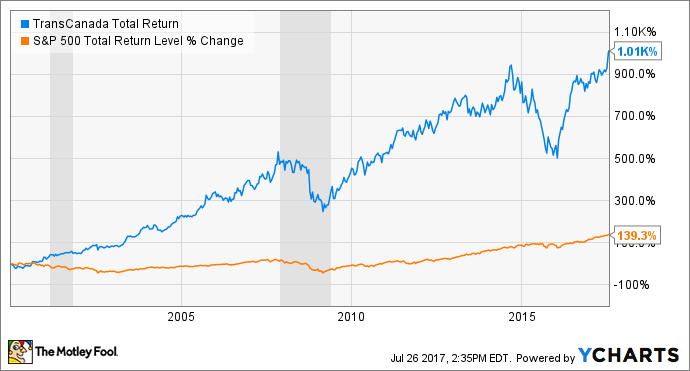For some investors, owning stocks is the last thing in the world they'd want to do in a bear market. But for those who like steady income and who have long-term perspectives, some dividend stocks are great to hang on to during market downturns.
We asked three Motley Fool investors which dividend stocks they think smart investors should consider owning in bear markets. Here's why they suggested McDonald's (MCD +0.38%), TransCanada (TRP +2.36%), and Johnson & Johnson (JNJ +1.33%).

Image source: Getty Images.
Decades of dividend growth
Tim Green (McDonald's): McDonald's is getting its mojo back, reporting global comparable sales growth of 6.6% and U.S. comparable sales growth of 3.9% during the second quarter. Systemwide sales rose 8% adjusted for currency, driven by strong comparable sales growth and an increase in the number of restaurants.
McDonald's focus on providing value for its customers is one reason why the stock can easily shake off bear markets. Revenue took only a small hit in 2009 due to the financial crisis, but earnings continued to march higher. The dividend also didn't miss a beat, a testament to the strength of the business. The company has increased its dividend, which currently yields around 2.4%, for 41 consecutive years, through a wide variety of market conditions.
Things are going well for McDonald's, but it is still pushing to stay ahead of the curve. Via a partnership with Uber Eats, McDonald's now offers delivery from thousands of restaurants around the world. The company is also in the process of rolling out mobile ordering and pickup, which will allow customers to skip the line.
While the stock is expensive, trading for around 28 times earnings, McDonald's solid performance during the last bear market should provide investors some comfort.
The total (return) package
Matt DiLallo (TransCanada): Canadian energy infrastructure behemoth TransCanada generates steady earnings in good markets and in bad. That's because fee-based contracts currently underpin the bulk of its annual cash flow, enabling the company to grow its dividend in each of the past 17 years. That time frame is worth noting since it includes two major recessions and one of the worst oil market downturns to hit the industry since the late 1980s.
Although TransCanada's stock price did take a hit during the financial crisis and the most recent oil market meltdown, investors who held shares throughout those bear markets came out on top, especially if they reinvested their growing dividend:
TRP Total Return Price data by YCharts.
Meanwhile, investors in future bear markets could do even better because TransCanada has become an even stronger company over the past year. After completing several strategic initiatives to reposition its portfolio last year, the company now gets 95% of its cash flow from stable fee-based sources, up from 90% just a couple of years ago. In addition, it has a large pipeline of fee-based projects in its backlog, which it expects will fuel 8% to 10% dividend growth through at least 2020. That's an acceleration from the 7% compound annual rate it delivered during the first 15 years of this century.
With an even larger backlog of projects in development and a clear need for more energy infrastructure in the coming years, TransCanada should have no problem keeping its momentum going. That should enable the company to continue increasing its dividend in both bull and bear markets, creating more value for investors along the way.
A Band-Aid for a bear market
Keith Speights (Johnson & Johnson): For some stocks, going through a bear market is traumatic -- like a patient going into an emergency room with serious injuries. It takes a long time to stop the bleeding, and the damage is severe. For Johnson & Johnson, though, bear markets amount to the equivalent of a scratch that only require a Band-Aid.
Speaking of Band-Aids, they're one of the reasons why Johnson & Johnson stock performs relatively well during big market downturns. People need them regardless of what's going on in the stock market or the economy. The same is true with many of J&J's products, from over-the-counter products like Benadryl, Listerine, and Tylenol to prescription drugs like Imbruvica, Stelara, and Xarelto.
Another reason why J&J weathers rough storms better than most is its dividend. Many investors own the stock in large part because of its steady dividend payments. Johnson & Johnson is a member of the elite group of Dividend Aristocrats and has increased its dividend for 54 consecutive years. For shareholders primarily seeking income in the form of dividends, there's an incentive to hold J&J stock through bear markets. As a result, you don't tend to see the huge sell-offs that some stocks experience.
If you want proof that Johnson & Johnson is a pretty smart choice for bear markets, look back to 2008. That was the year of the huge market plunge in the midst of the biggest financial crisis since the Great Depression. The S&P 500 index dropped nearly 38%. J&J stock also fell that year but only by 9% -- nothing a Band-Aid wouldn't fix.









